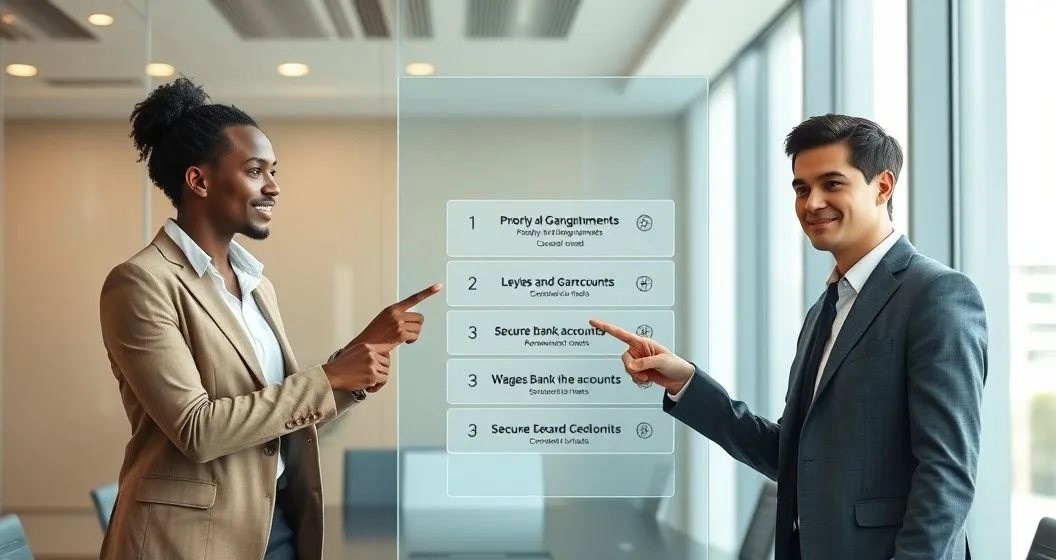Overview
Tax levies and garnishments are different legal tools for collection. A levy lets a government seize property (bank accounts, certain paychecks, business assets) to satisfy a tax debt after notice, while a garnishment is a court-ordered (or agency-ordered) withholding from wages or accounts by an employer or bank for any creditor type. Priority determines who is paid first when multiple parties claim the same asset.
How priority is determined
- Type of remedy: Levies (often used by tax agencies) and garnishments (common for child support and private creditors) follow distinct rules.
- Liens and perfection: A secured creditor with a perfected lien (for example, a mortgage or UCC-filed security interest) can outrank unsecured creditors, including some tax claims, depending on timing and statute.
- Timing: Many priority disputes turn on which lien or levy was filed or served first.
- Governing law: Federal levy powers (for federal taxes) and federal protections for wage garnishments (Consumer Credit Protection Act) interact with state laws that can change priority and procedures.
Typical priority order (general guide)
Priority can vary by asset and jurisdiction. The list below is a common framework, but exceptions are frequent—always check state law and the exact collection method.
| Creditor / Claim Type | Typical Priority | Notes |
|---|---|---|
| Child support & alimony withholding | Very high (wages) | State and federal rules often give child support priority for wage withholding. See your state child support agency. |
| Federal tax levies / federal tax liens | High (varies by asset) | Federal tax liens attach to property; IRS levies can seize wages/bank accounts after notice. Priority vs. secured creditors depends on lien timing and perfection. (IRS guidance: https://www.irs.gov/businesses/small-businesses-self-employed/levies) |
| State tax agency levies/liens | High (after federal in many cases) | States have strong collection powers; priority depends on state law and whether the state filed a lien before other creditors. |
| Secured creditors (mortgage, UCC security interests) | Depends on perfection/time | A properly perfected security interest often takes precedence over unsecured claims. |
| Child support arrears (non-wage assets) | High in many states | States may place liens or levies to collect past-due support. |
| Private creditors (credit cards, personal loans) | Lower | Garnishments for consumer debts are subject to federal and state caps (see CFPB). |
Key caveats
- Wages: Child support often preempts other garnishments. For consumer debts, federal law caps garnishment at the lesser of 25% of disposable earnings or the amount by which weekly disposable earnings exceed 30 times the federal minimum wage (Consumer Financial Protection Bureau). See: https://www.consumerfinance.gov/ask-cfpb/can-a-creditor-garnish-my-wages-en-1798/
- Bank accounts: The first levy or lien served and perfected against an account frequently determines priority. The IRS uses bank levies; states may also attach accounts.
- Liens vs. levies: A tax lien is a claim against property; a levy is the actual seizure. Priority disputes commonly focus on lien filing dates and whether a creditor perfected a security interest first.
Practical steps if you receive a levy or garnishment notice
- Read notices carefully and note deadlines. The IRS and most states give a short window to respond or request a hearing. (IRS collection rights and appeals: https://www.irs.gov/appeals/collection-due-process-rights)
- Confirm who has priority. Ask whether the levy/garnishment is federal, state, child-support, or private—this affects remedies and caps.
- Evaluate exemptions and protected income. Social Security, certain public benefits, and portions of wages may be protected depending on the source and state law.
- Negotiate or apply for relief: installment agreements, an offer in compromise (for taxes), innocent spouse relief, or temporary hardship releases can stop or limit collection.
- Consider a Collection Due Process (CDP) hearing for IRS levies or appeal rights for state actions.
- Get legal or tax help if the amounts are large, if multiple creditors are involved, or if you suspect priority was mishandled.
Common misconceptions
- “All debts are equal.” They are not—child support, certain tax claims, and perfected security interests often come before unsecured creditors.
- “The IRS always gets paid first.” Not always. Priority depends on lien dates, perfected security interests, and the collection method.
- “You can ignore notices.” Ignoring collection notices eliminates options (payment plans, appeals) and often results in enforced collection.
Real-world examples (short)
- Small business owner: A bank-held UCC financing statement filed before an IRS lien can allow the bank to claim cash in the business account ahead of an IRS levy, depending on timing and state law.
- Wage withholding: A parent with child-support orders will usually see those withholdings taken before many other garnishments.
When to seek professional help
If multiple creditors claim the same asset, a lien priority dispute arises, or you face an imminent bank levy or wage garnishment that will cause financial hardship, consult a tax attorney, enrolled agent, or consumer-law attorney promptly. In my practice helping clients with multi-creditor collection problems, early intervention (filing appeals, negotiating installment agreements, or obtaining temporary injunctions) often preserves essential income and prevents business closures.
Related FinHelp articles
- How Tax Levies and Garnishments Work and How to Stop Them: https://finhelp.io/glossary/how-tax-levies-and-garnishments-work-and-how-to-stop-them/
- How Wage Garnishments Work and How to Stop Them: https://finhelp.io/glossary/how-wage-garnishments-work-and-how-to-stop-them/
Authoritative sources and further reading
- IRS — Levies and Seizures: https://www.irs.gov/businesses/small-businesses-self-employed/levies
- IRS — Collection Due Process & Taxpayer Rights: https://www.irs.gov/appeals/collection-due-process-rights
- Consumer Financial Protection Bureau — Can a creditor garnish my wages?: https://www.consumerfinance.gov/ask-cfpb/can-a-creditor-garnish-my-wages-en-1798/
Disclaimer
This article is educational and does not replace personalized legal or tax advice. Rules vary by state and situation; consult a qualified tax professional or attorney for specific guidance.



